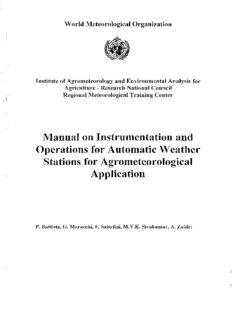
Manual on Instrumentation and Operations for Automatic Weather Stations for Agrometeorological ... PDF
Preview Manual on Instrumentation and Operations for Automatic Weather Stations for Agrometeorological ...
World Meteorological Organization Institute ofAgrometeorology and Environmental Analysis for Agriculture - Research National Council Regional Meteorological Training Center Manual on Instrumentation and Operations for Automatic Weather Stations for Agrometeorological Application P. Battista, G. Maracchi, F. Sabatini, M.V.K. Sivakumar, A. Zaldei { 1 [ { i I I ! I t L Manual on Instrumentation and Operations for Automatic Weather Stations for Agrometeorological Application P. Battista Ce.S.LA - Center for Computer Science in Agriculture - Georgofili Academy, Via G. Caproni, 8- 50145 Florence, Italy. G. Maracchi LAT.A - C.N.R. - Institute of Agrometeorology and Environmental Analysis for Agriculture -ResearchNational Council- P.le delle Cascine, 18 - 50144 Florence, Italy. F. Sabatini LAT.A - C.N.R. - Institute of Agrometeorology and Environmental Analysis for Agriculture -ResearchNational Council- P.le delle Cascine, 18 - 50144 Florence, Italy. M.V.K. Sivakumar World Meteorological Organization - Agricultural Meteorology Division - 41 Avenue Giuseppe Motta- 1211 Geneva2 - Switzerland A. Zaldei AM.F. - Applied Meteorological Foundation - Via G. Caproni, 8 - 50145 Florence, Italy. This document was prepared to education plllpose, with examples and exercises, using trademarked names and symbols. This is due to the necessity of explain technical operations and it doesn't implicate any preference by the authors. r f' 1-' r t' 1 ~ J L t f [ f f 1 f f L Index- Introduction MANUALON INSTRUMENTATION AND OPERATIONS FOR AUTOMATIC WEATHER STATIONS FOR AGROMETEOROLOGICAL APPLICATIONS r~ i-' I I f' I { I I t [ t I I f I I { 1 L Index - Introduction - INTRODUCTION - 1) SENSORS 1.1) Temperature 1.1.1) Thermocouples 1.1.2) Thermistors 1.1.3) Thermoresistances 1.1.4) Integrated sensors 1.1.5) LinearizedThermistors 1.2) Air Humidity 1.2.1) Hygrometric sensors 1.2.2) Psycrometric sensors 1.2.3) Dew-point sensors 1.3) SoilHumidity 1.3.1) NeutronProbe 1.3.2) Bouyoucos probes 1.3.3) Tensiometers 1.3.4) Time Domain Reflectometry (TDR) 1.4) Air Pressure 1.4.1) Capacity sensors 1.4.2) Inductivity sensors 1.4.3) Piezoelectric sensors 1.4.4) Potentiometetric sensors 1.4.5) Resistivity sensors 1.4.6) Semicondutor sensors 1.5) Solar Radiation 1.5.1) Thermopile 1.5.2) Photocell 1.6) Wind Speed 1.6.1) Cup Anemometer 1.6.2) Hot wire Anemometer 1.6.3) Ultrasonic Anemometer 1.6.4) DopplerAnemometer 1.7) Wind direction 1.8) Rainfall 1.8.1) Pluviometer 1.8.2) Meteorological Radar 1.8.3) Rain drop energy sensor (Impactometer) 1.9) Evaporation 1.9.1) Evaporimeters 1.9.2) Lysimeters 1.10) Leafwetness 1.11) Soil heat flux 2) DATA ACQUISITION SYSTEMS 2.1) Data-Logger Index- Introduction 2.2) Data-Loggerprogramming 2.3) Datastorage 2.3.1) Solid state memory 2.3.2) PC card 2.3.3) Magnetic tape 2.3.4) Hard disk 2.4) Dataretrieval 2.4.1) Personal Computer cOlmection 2.4.2) Memory card 2.4.3) Remote Transmission ofdata 2.4.3.1) Radio 2.4.3.2) Modem 2.4.3.2.1) Dedicated or commutated phone line 2.4.3.2.2) Cellularphones 2.4.3.2.3.) Satellite 3) STATE OF THEART AND AVAILABLE INSTRUMENTATION 3.1) Data-logger 3.2) Sensors '1 '1) Integrated logger and transducer systems J.J 3.4) Low-cost agrometeorological station ofC.N.R.-LA.T.A. 3.4.1) Data-logger 3.4.2) Sensors 4) UTILIZATION AND MAINTENANCE OF AUTOMATIC AGROMETEOROLOGICAL STATIONS 4.1) Agrometeorological station location 4.2) Sensors employment 4.2.1) Air temperature 4.2.2) Soil temperature 4.2.3) Air humidity 4.2.4) Soil humidity 4.2.5) Airpressure 4.2.6) Solarradiation 4.2.6.1) Global Radiation 4.2.6.2) Diffuse radiation 4.2.6.3) Directradiation 4.2.6.4) Outgoing radiation 4.2.6.5) Net radiation 4.2.6.6) Photosynthetically Active Radiation (P.A.R.) 4.2.6.7) Sunshine duration 4.2.6.8) UV-B radiation 4.2.7) Wind speed 4.2.8) Wind direction 4.2.9) Rainfall 4.2.10)Evaporation 4.2.11)Leafwetness 4.2.12)Heat flux plate I L Index- Introduction 5) INSTRUMENTATIONPOWERSUPPLYAND PROTECTION 5.l) Power supply 5.1.1) Main powersupply - No-break power 5.1.2) Battery power supply - Solarpanel 5.2) Instrumentprotection 5.2.1) Environmental class quality 5.2.2) Over-transientvoltageprotection 6) SENSORS CALIBRATION 6.1) Calibrationprinciples 6.1.1) Sensors comparison calibration 6.1.2) Calibrationuncertainty 6.1.3) Methodology 6.1.4) Calibrationresponse curve 6.1.5) Time response 6.2) Sensors calibration 6.2.1) Air temperature 6.2.2) Air humidity 6.2.3) Air pressure 6.2.4) Solarradiation 6.2.5) Wind speed 6.2.6) Rainfall 6.2.7) Evaporation 6.2.8) Heat Flux Plate 7) DATAANALYSIS AND ARCHIVING 7.1) Data validation 7.1.1) Values range checkandtime-based verification 7.1.2) Historical data series comparison(statistical method) 7.2) Dataprocess 7.2.1) Time unit (hour, day, decade, month, year...) 7.2.2) Dataprocessing choice 7.2.3) Agroclimatologica1 processing 7.2.4) Datavisualization 3.2.4.1) Graphic display 3.2.4.2)Numeric (datatable) 7.3) Dataformat 7.3.1) Binary 7.3.2) Hexadecimal 7.3.3) ASCII format 7.3.4) Commercial and specific software data storage 7.4) Data diffusion 7.4.1) Weather rep0rt 7.4.2) Telefax 7.4.3) Television 7.4.4) Internet r Index- Introduction f' 8) EXAMPLES OF INSTALLATIONS FOR SPECIFICPURPOSES l' 8.1) Dimensioning ofsolarpanelpower for agrometeorological station 8.2) Installation for air temperature profile study r 8.3) Installationfor wind erosion study 8.4) Installation for crop water irrigation scheduling 8.5) Installationfor crop protection strategy based on agrometeorological data 8.6) Installationfor UV-B radiationstudy f' I 9) APPENDIX r' 9.1) Metrology characteristics ofinstruments 9.2) Instrument's employment features 9.3) Conversiontables for main measurements units f' 9.4) Institutions and Companies addresses ofagrometeorological interest 9.5) Julian days table 9.6) Crop coefficients f 10)INTERNETUSEFUL ADDRESSES f I { ( L f r 1 I I t L
Description: